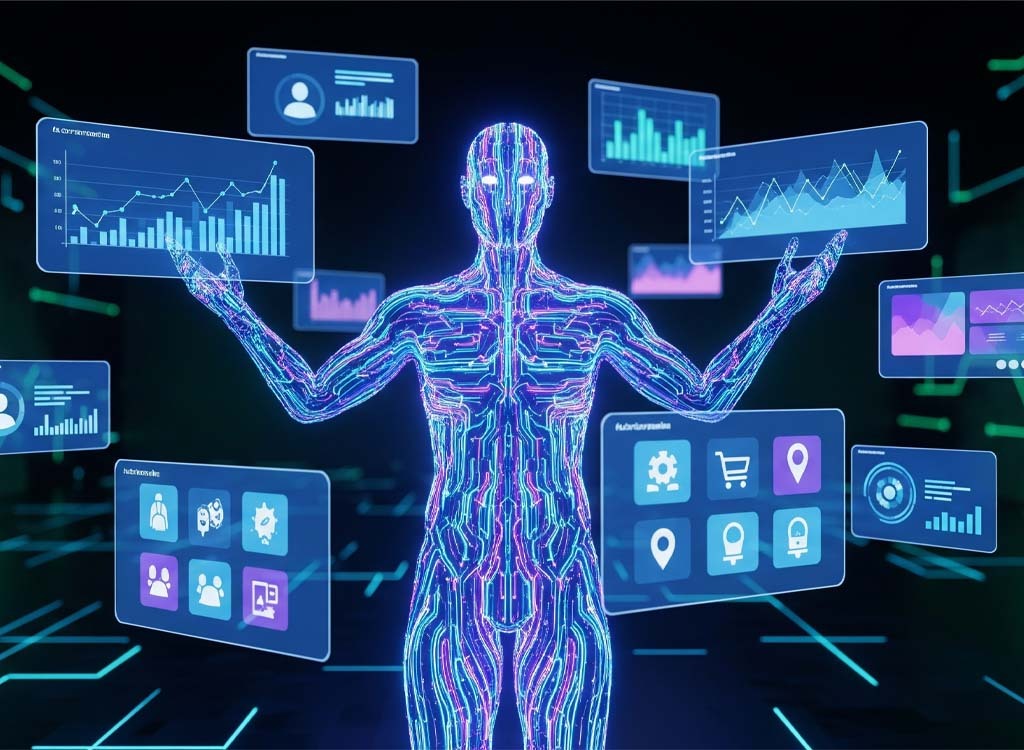AI in Digital Marketing: 10 Inspiring Ways to Transform Your Strategy This Year

Marketing has always been about connecting with people, but the tools we use to make those connections are changing rapidly. Today, AI in marketing is transforming the way brands attract, engage, and retain customers. From automating tasks to predicting customer behaviour, AI gives businesses the chance to create smarter and more effective campaigns.
The most exciting part is how businesses are already seeing results. AI in marketing examples range from chatbots to personalized ads; it’s clear that this technology is no longer optional; it’s essential for staying ahead.
1. Personalized Marketing with AI
Consumers want experiences that feel personal, not generic. AI helps marketers analyze browsing habits, purchases, and preferences to deliver the right content at the right time. Instead of guessing what works, AI systems recommend products and craft messages that resonate. This is personalization at scale; something traditional marketing couldn’t achieve.
2. Smarter Customer Service with Chatbots
AI-powered chatbots are now a standard feature in customer service. They provide quick answers, handle bookings, and even recommend products. For companies, this means fewer missed opportunities and 24/7 support without needing a large number of customer service representatives.
3. Predictive Analytics for Better Decisions
AI predicts trends before they happen. With predictive analytics, marketers can see which campaigns will succeed, what customers may want next, and where to allocate budgets. This approach reduces wasted spending and makes strategies data-driven.
4. AI-Powered Content Creation
From blog outlines to video captions, AI helps speed up the creative process. Tools powered by artificial intelligence marketing examples can suggest topics, generate drafts, or optimize headlines for engagement. While human creativity is still crucial, AI makes producing content faster and more consistent.
For more insights, see What Google Thinks About AI Content Creation to understand how AI-generated content is shaping the industry.
5. Improved Email Marketing
Email remains powerful, and AI takes it further. Algorithms analyze user interactions to send emails at the perfect time with personalized subject lines and product suggestions. This leads to higher open rates, better engagement, and more conversions.
6. AI in Social Media Strategy
AI tools analyze massive amounts of social data to reveal trends and customer interests. This allows marketers to know which content formats work best, when to post, and how to engage followers more effectively. Social media campaigns become less about trial-and-error and more about data-backed results.
7. AI for SEO and Content Optimization
SEO is always evolving, but AI simplifies it. By analyzing user intent, keyword trends, and competitor data, AI suggests how to structure content for better rankings. It also helps marketers optimize old articles, keeping them fresh and relevant for search engines.
8. AI in Paid Advertising Optimization
One of the strongest applications of AI in marketing is in advertising. AI ensures ads are shown to the right audience at the right time, automatically adjusting bids and placements for better ROI. Instead of manually managing campaigns, marketers can rely on AI to fine-tune budgets across Google DV360, Meta Ads, and other platforms.
9. AI for Voice and Visual Search
With voice assistants and image recognition growing in use, AI is making search more natural. Consumers can search with photos or voice commands, and AI ensures relevant results appear instantly. Marketers who optimize for voice and visual search now will gain a strong advantage in the coming years.
10. Companies Using AI in Marketing Successfully
Many global companies are using AI in marketing and showing how powerful AI can be in driving business growth:
- Netflix uses AI to analyze viewing patterns and recommend movies or shows each user is most likely to watch next. Personalized recommendations are a major reason behind its strong customer engagement.
- Amazon relies on AI-driven product recommendations, dynamic pricing, and inventory management to create a smooth shopping experience. Its recommendation engine reportedly drives more than 30% of its sales.
- Spotify uses AI to generate personalized playlists like “Discover Weekly,” which adapts to each listener’s music habits, boosting user retention.
- Coca-Cola applies AI to analyze consumer feedback and social media conversations. The insights help design new flavours, packaging, and targeted marketing campaigns.
- Sephora uses AI-powered chatbots and virtual try-on tools to improve online shopping, making the beauty buying process highly personalized.
These examples prove that companies using AI for marketing aren’t just tech giants. From entertainment to retail, AI helps brands build stronger customer connections, increase efficiency, and drive revenue.
For a forward-looking perspective, see What are the benefits of e-commerce AI in the future? to explore how businesses can keep growing with this technology.
How AI Improves Different Marketing Areas
Conclusion
AI is no longer just a trend; it’s transforming digital marketing in real ways. From predictive analytics to voice search, the opportunities are endless for brands ready to use these tools.
By learning from AI in digital marketing and watching how leading companies apply it, every business can take practical steps toward smarter campaigns. Whether it’s through customer personalization, SEO, or paid ads, AI helps marketers connect with audiences more effectively than ever before.
Run Marketing helps businesses to unlock these strategies so growth is consistent, measurable, and future-ready.
FAQs
1. What is the AI in digital marketing?
AI in digital marketing is the way to use artificial intelligence to interpret data, campaigns, and enhance customer experiences.
2. What are the artificial intelligence applications in marketing?
They can include chatbots, predictive analytics, customized product recommendations, and automated advertisement targeting.
3. Why are companies using AI in marketing today?
It enhances effectiveness, saves money, and allows companies to get to know their clients better.
